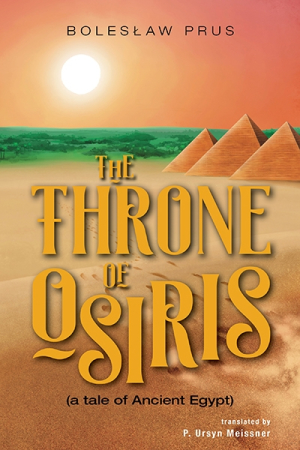The Throne of Osiris
A Tale of Ancient Egypt
In the exciting historical novel The Throne of Osiris, a pharaoh establishes himself as a ruler in ancient Egypt.
Bolesław Prus’s historical novel The Throne of Osiris follows the rise and fall of Ramses XIII.
Ramses is a headstrong prince who struggles against cultural and religious obstacles while making his way to power in the eleventh century BCE. Ramses wants to take his place in the line of rulers, both out of personal ambition and out of a sense of duty. “Wisdom and fairness” are said to be his guide. Though drawn to his duties, he is also tempted by his profligate cousin Tutmozis, who lives for pleasure and avoids responsibility. His consort, Sara, is a Hebrew, and their relationship is complicated by historical antagonism between their people.
Ramses is locked in a struggle for dominance with the priest Herihor, who imposes limitations on his efforts to rule with rationality and to better the lives of his subjects. Early on, Ramses is forced to change strategy in a war games exercise in order to avoid trampling a pair of sacred beetles. This ends up having a devastating impact on a peasant laborer. Ramses feels pity for the man; this opens his eyes to the contradictions between his professed beliefs and the world he lives in.
This is a coming of age story about a young prince learning about the messiness of ruling. At one point, Ramses tosses and turns in a night of feverish dreams; like a hero from Greek tragedy, he battles a system that is beyond his grasp. His is an old-fashioned tale whose tones are both a strength and a weakness. Its larger-than-life characters include princes, priests, and warriors whose exchanges are prone to lapse into mannered biblical speech. The men are conflicted; the women beside them fill tropes, as of the helpless ingénue and a scheming mother. Sara is passive, and she accepts being sold to Ramses. Early on, their relationship is developed in contrived terms, with Ramses falling hard for her after a few familiar exchanges. As the novel progresses, their relationship deepens, especially as they deal with the prejudice of Egyptian society.
The book’s descriptions of land, clothing, rituals, and the economics of ancient Egypt are rich and detailed. When Ramses strikes a deal with Dagon the Phoenician to fund his campaign, their conversation touches upon interest rates and repayment terms; the naïve young ruler learns that political success depends on finance as much as bravery and dedication. Yet despite the seriousness of its themes and the density of its historical context, the book is light enough on its feet to enjoy throughout. Its outcome is no surprise, yet the irony of the pharaoh’s downfall, and its effect on Egyptian society, still make a big impact, illustrating, as one character puts it, the “mysteries of wisdom and the tale of an ancient time.”
In the exciting historical novel The Throne of Osiris, a pharaoh establishes himself as a ruler in ancient Egypt.
Reviewed by
Matt Benzing
Disclosure: This article is not an endorsement, but a review. The publisher of this book provided free copies of the book and paid a small fee to have their book reviewed by a professional reviewer. Foreword Reviews and Clarion Reviews make no guarantee that the publisher will receive a positive review. Foreword Magazine, Inc. is disclosing this in accordance with the Federal Trade Commission’s 16 CFR, Part 255.

